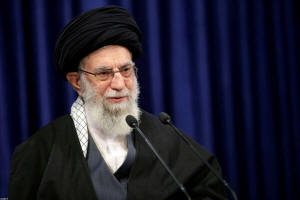Iran's Khamenei says water crisis protesters cannot be blamed
 Send a link to a friend
Send a link to a friend
 [July 23, 2021]
DUBAI (Reuters) - Supreme Leader
Ayatollah Ali Khamenei said on Friday that Iranians protesting over
water shortages cannot be blamed, and called on officials to deal with
the water problem. [July 23, 2021]
DUBAI (Reuters) - Supreme Leader
Ayatollah Ali Khamenei said on Friday that Iranians protesting over
water shortages cannot be blamed, and called on officials to deal with
the water problem.
Street protests over water shortages spread from the oil-rich
southwestern Khuzestan province to a nearby area overnight where one
youth was shot dead with pellet guns and seven were injured, a police
official said, blaming "counter-revolutionaries".
"The people showed their displeasure, but we cannot really blame the
people because the issue of water is not a small one especially in
Khuzestan's hot climate," Khamenei was quoted by state TV as saying, in
reference to the protests.
"Now, thank God, all the various agencies, governmental and
non-governmental, are working (to resolve the water crisis) and should
continue with all seriousness," Khamenei added.
Demonstrators in the town of Aligudarz in Lorestan province marched to
voice support for protesters in neighbouring Khuzestan late on Thursday
on the eighth night of protests. Videos showed protesters chanting
slogans against Khamenei.

Other videos from Aligudarz showed two young men who appeared to have
been shot. Reuters could not independently authenticate the videos.
The semi-official news agency Fars quoted a police official as saying
several people were arrested after the unrest and the shootings in
Aligudarz.
At least one policeman and three young men had been shot dead in earlier
protests. Officials have blamed "rioters", but activists said on social
media the protesters were killed by security forces in Khuzestan.
Amnesty International said on Friday at least eight people have been
killed during the week-long crackdown.
[to top of second column]
|

Iranian Supreme Leader Ayatollah Ali Khamenei delivers a televised
speech in Tehran, Iran, January 8, 2021. Official Khamenei
Website/Handout via REUTERS/File Photo

"Video footage verified by Amnesty... and consistent
accounts from the ground indicate security forces used deadly
automatic weapons, shotguns with inherently indiscriminate
ammunition, and tear gas to disperse protesters," it said.
Internet blockage observatory NetBlocks said it could "corroborate
widespread user reports of cellular network disruptions, consistent
with a regional internet shutdown intended to control protests."
Authorities have curbed internet access during unrest in the past to
make it more difficult for protesters to post videos on social media
to generate support and to communicate among themselves.
Iran's worst drought in 50 years has affected households, devastated
agriculture and livestock farming, and led to power blackouts.
Iran's economy has been blighted by sanctions imposed by former U.S.
President Donald Trump, and the COVID-19 pandemic. Workers,
including thousands in the key energy sector, and pensioners have
protested for months amid discontent over mismanagement,
unemployment and inflation.
(Reporting by Dubai newsroom; Editing by Toby Chopra)
[© 2021 Thomson Reuters. All rights
reserved.] Copyright 2021 Reuters. All rights reserved. This material may not be published,
broadcast, rewritten or redistributed.
Thompson Reuters is solely responsible for this content.
 |